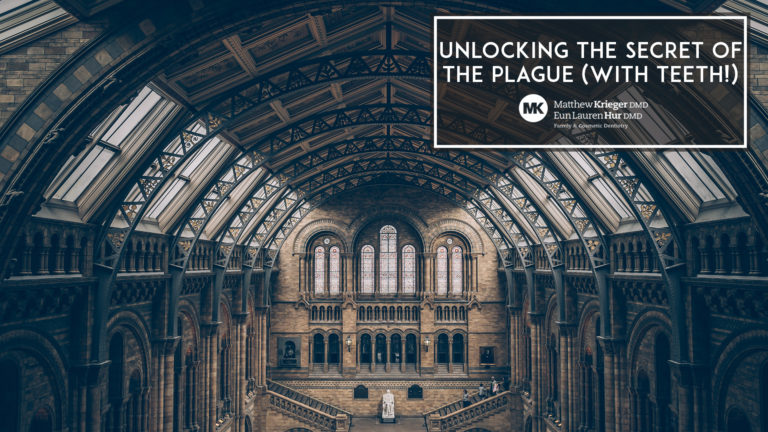Have you ever wondered what it would be like to live in ancient Egypt? This oft-romanticized time had some not-so-beautiful features, including its dental work. Still, the fact that ancient Egyptians were making great strides in learning to take care of teeth is nothing short of astounding. It was a time with no pain-free dentistry– never mind cosmetic procedures that give you a beautiful smile like Invisalign or teeth whitening. Practitioners had a rudimentary understanding of anatomy and used some downright painful practices. One thing was the same, however. Then, as now, you’d have to be proactive about your dental health — except now it’s much easier to schedule a regular dental appointment!
Your medic or dentist at the time — and there is some evidence that dentistry was a specialized profession — would think you had worms boring into your teeth because the holes caused by cavities look very similar to those caused by worms making their way through wood. It was a working theory at the time, and without the knowledge, we now have of microbiology, it was better than nothing.
With the exception of the honey and barley, which can taste rather delicious, fillings in ancient Egypt probably tasted terrible.
Instead of being able to mold a perfect fit like we can now, dentists in ancient Egypt had to hope the lost tooth from the person was still viable. If not, they would find a donor tooth. Imagine having someone else’s lost tooth in your mouth permanently! The dentists would drill a hole in the teeth and wire them to the surrounding teeth using gold or silver wire meant to hold up. This procedure may have been performed after death as well, as the Egyptians strongly revered being whole in the afterlife.
If the royals were dying of infection and excruciating dental pain, you can bet that those in the middle and lower classes weren’t getting the antibiotics they needed to keep them healthy when facing dental problems.
Both then and now, being proactive about your dental health is the best way to ward off problems. The offices of Drs. Krieger and Hur have made it easy to book your appointment, either by sending us a quick email by clicking here or by giving us a phone call at (201) 560-0606. We won’t pack your cavity full of honey, but we will give you the royal treatment when you book your spot for pain-free, modern dentistry with our team.
Cavities and Tooth Worms
If you’ve ever been unlucky enough to have a cavity, you know they hurt. If your dentist has shown you the damage done to your tooth by letting you sneak a peek at your X-rays, you’ll have seen that a cavity looks like what it is — a small hole. Today, we know that plaque and bacteria cause a breakdown of the tooth’s enamel. In ancient Egypt, however, you would have been told you had a tooth worm.Your medic or dentist at the time — and there is some evidence that dentistry was a specialized profession — would think you had worms boring into your teeth because the holes caused by cavities look very similar to those caused by worms making their way through wood. It was a working theory at the time, and without the knowledge, we now have of microbiology, it was better than nothing.
Fillings Probably Tasted Horrible
If you were fortunate enough to have a dentist who could stabilize a loose tooth or fill a cavity, the material used probably tasted downright horrible. If you were lower-class to middle-class, you might be lucky to have the tooth packed with linen that was dipped in cedar oil or fig juice to keep the pain at bay and keep infection to a minimum. If you were at the mercy of a more skilled dentist, you might find yourself with something similar to a modern composite filling, except instead of high-tech materials it would be made of ground barley as the bulk or filler, honey as a binder and antibiotic, and a pigment that also served as an antiseptic, yellow ochre.With the exception of the honey and barley, which can taste rather delicious, fillings in ancient Egypt probably tasted terrible.
Reconstruction Work Was Gruesome
If you were royalty, you had a shot at a decent smile. Starting around 1600 BCE, Egyptian dentists serving the pharaohs were starting to recognize gum disease and its effects — but didn’t know what to do about it. Because periodontal disease can cause tooth loss, the royal dentists were trained in reconstructive measures, including giving the kings and queens of Egypt bridges.Instead of being able to mold a perfect fit like we can now, dentists in ancient Egypt had to hope the lost tooth from the person was still viable. If not, they would find a donor tooth. Imagine having someone else’s lost tooth in your mouth permanently! The dentists would drill a hole in the teeth and wire them to the surrounding teeth using gold or silver wire meant to hold up. This procedure may have been performed after death as well, as the Egyptians strongly revered being whole in the afterlife.
Infection? Good Luck
Egyptians in historical times couldn’t just book a dental appointment to prevent or treat an infection, and the use of antibiotics was limited to hit-or-miss remedies. King Tut, who ruled around 1300 BCE, is thought to have died from a dental infection that entered his bloodstream. Hatshepsut, one of the only women pharaohs to rule, died from a dental abscess — an infection that started in her tooth and traveled into her sinus cavities and beyond.If the royals were dying of infection and excruciating dental pain, you can bet that those in the middle and lower classes weren’t getting the antibiotics they needed to keep them healthy when facing dental problems.
Being Proactive Saved — and Saves — Lives
Although we no longer live in the world that the ancient Egyptians created and dental science has come a long way, tooth decay, infections and loose teeth can still cause problems — and sometimes they’re still dangerous or even deadly if left untreated.Both then and now, being proactive about your dental health is the best way to ward off problems. The offices of Drs. Krieger and Hur have made it easy to book your appointment, either by sending us a quick email by clicking here or by giving us a phone call at (201) 560-0606. We won’t pack your cavity full of honey, but we will give you the royal treatment when you book your spot for pain-free, modern dentistry with our team.


